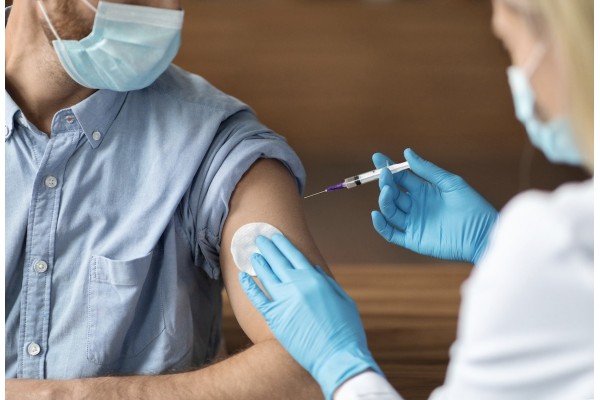COVID-19 that occurs after vaccination carries a much lower risk of severe illness
May 14, 2023
Source: https://www.news-medical.net/news/20230511/COVID-19-that-occurs-after-vaccination-carries-a-much-lower-risk-of-severe-illness.aspx
 440
440

Scientists have developed several vaccines to prevent infection by the severe acute respiratory syndrome coronavirus 2 (SARS-CoV-2), the causal agent of the ongoing coronavirus disease 2019 (COVID-19) pandemic. Previous studies have shown that although vaccine-induced immunity declines over time, vaccine effectiveness (VE) against severe COVID-19 persists for extended periods.
Background
Several studies have indicated that COVID-19 vaccines were less effective in preventing severe illness in older adults and otherwise immunocompromised patients. Nevertheless, COVID-19 vaccination has reduced disease severity among patients hospitalized due to SARS-CoV-2 infection.
Fully vaccinated people who were hospitalized due to symptomatic COVID-19 were less likely to require mechanical ventilation, intensive care unit (ICU) admission, or die as compared to unvaccinated individuals. However, there remains a lack of studies that have evaluated the relationship between COVID-19 booster vaccination and disease severity using large samples infected with different SARS-CoV-2 variants.
About the study
A recent Journal of Infectious Diseases study investigates the effect of COVID-19 vaccination on severe infections that required hospitalization. The researchers also explored residual confounding factors using COVID-19-negative controls and a difference-in-differences method.
The VISION Network is a collaboration of United States healthcare systems and research centers that provides vaccination, as well as medical and laboratory records. Patients who were above 18 years of old without immunocompromising conditions and were hospitalized for over 24 hours due to COVID-19-like illness (CLI) between August 19, 2021, and March 28, 2022, were included in the study cohort. All relevant information on these patients was available at VISION Network sites.
A test-negative control cohort comprised patients with negative molecular assay results for COVID-19 within 14 days before and 72 hours after hospital admission. This study included fully vaccinated individuals with two doses of a messenger ribonucleic acid (mRNA) COVID-19 vaccine and those who received the booster or third dose. Unvaccinated individuals were also included for comparative analysis.
All eligible participants who were fully vaccinated with two COVID-19 mRNA vaccines were further divided into two groups. These groups included a ‘two-dose recent’ group, which included individuals who received their second vaccine dose less than 150 days prior to the index date, and a ‘two-dose distant’ group comprising individuals who received their second vaccine dose 150 days or more prior to the index date.
To investigate disease severity due to COVID-19, ICU admission, in-hospital death, and length of hospitalization were considered.
Study findings
A total of 27,149 individuals were hospitalized due to COVID-19, 59.2% and 40.8% of whom were hospitalized during the SARS-CoV-2 Delta and Omicron dominant periods, respectively. These participants were included in the test-positive cohort. It was observed that 75% of the hospitalized individuals were unvaccinated.
As compared to the vaccinated group, unvaccinated individuals were much younger. Typically, the younger age group is less likely to have underlying comorbidities, such as diabetes and cardiovascular conditions.
A higher attenuation in disease severity prevailed among those who received the booster vaccine than those who completed the two-dose vaccine regime. This could be due to the waning of vaccine-induced immunity, which was re-instated after the booster dose.
Consistent with previous studies, the COVID-19 mRNA vaccine exhibited decreased effectiveness against severe infection caused by the Omicron variant as compared to the Delta variant.
In most cases, less protection against severe illness was observed in two-dose recent vaccinees as compared to two-dose distant or three-dose booster vaccinated patients. This could be due to the presence of an unknown factor not considered during the analysis.
The negative control group helped identify potential residual confounding factors after controlling for medical comorbidities and demographic factors, such as sex, race, urbanicity, and age. Finally, a difference-in-differences approach was applied to adjust for unmeasured factors, with all findings indicating that vaccination lowered disease severity.
Limitations
The current study has several limitations, including the consideration of COVID-19 tests that were conducted in medical settings and those that performed at home or in public health sectors were ignored. Therefore, a large number of COVID-19 patients were not included in this study.
In addition, information regarding COVID-19 prevention and treatments, such as antiviral medications and monoclonal antibodies, were not considered. Notably, these interventions would influence an individual’s disease trajectory.
The difference-in-difference approach did not consider the reasons for hospitalization among vaccinated and unvaccinated patients. The full spectrum of clinical symptoms among vaccinated and unvaccinated groups was not investigated; therefore, the role of vaccines in reducing meaningful outcomes could not be determined.
Conclusions
COVID-19-vaccinated individuals were strongly associated with lower rates of ICU admission and in-hospital mortality during the dominance of the Delta and Omicron variants. However, such an association was not found in unvaccinated individuals.
All evidence supported the fact that COVID-19 vaccination attenuates disease severity in hospitalized patients. However, future research related to COVID-19 severity attenuation will require more comprehensive data from a prospective study design rather than electronic health record data.
By editor
Read more on
- The first subject has been dosed in the Phase I clinical trial of Yuandong Bio’s EP-0210 monoclonal antibody injection. February 10, 2026
- Clinical trial of recombinant herpes zoster ZFA01 adjuvant vaccine (CHO cells) approved February 10, 2026
- Heyu Pharmaceuticals’ FGFR4 inhibitor ipagoglottinib has received Fast Track designation from the FDA for the treatment of advanced HCC patients with FGF19 overexpression who have been treated with ICIs and mTKIs. February 10, 2026
- Sanofi’s “Rilzabrutinib” has been recognized as a Breakthrough Therapy in the United States and an Orphan Drug in Japan, and has applied for marketing approval in China. February 10, 2026
- Domestically developed blockbuster ADC approved for new indication February 10, 2026
your submission has already been received.
OK
Subscribe
Please enter a valid Email address!
Submit
The most relevant industry news & insight will be sent to you every two weeks.



